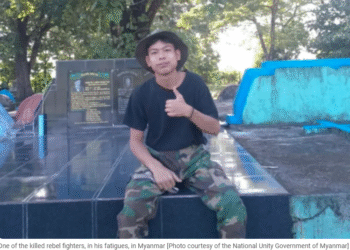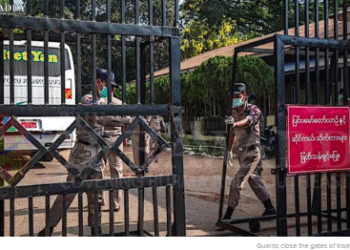By THE IRRAWADDY 13 August 2022
Min Aung Hlaing doing his best to worsen fuel crisis
With the country facing serious fuel shortages, junta chief Min Aung Hlaing told a meeting of his regime on Monday to reduce imports of oil and petroleum products, as the country has to spend billions of US dollars annually on imported fuel.
The junta chief, who has been hit by a financial crisis, called for systematic regulation of oil refineries in Myanmar, hoping that his regime can spend fewer US dollars on fuel imports, as Myanmar is heavily reliant on imported gasoline and diesel.
Min Aung Hlaing visited the site of a disused oil refinery in Yangon’s Thanlyin Township in April last year with plans to revive it to help solve the country’s fuel crisis. But more than one year after the junta chief’s visit to the site, there is still no sign that the refinery will be back in operation in the near future.
At the meeting, however, Min Aung Hlaing did not offer any short-term solutions to the country’s ongoing fuel crisis. Currently, fuel prices have reached a record high of over 2,000 kyats per liter. The crisis looks set to worsen, and prices will only go up further if the regime cuts imports.
Junta forms vigilante groups, citing public security
Deputy junta chief Soe Win reiterated the regime’s plan to form public security groups to restore order, at a regime meeting on Wednesday, in a reflection of how hard the regime has been hit by combat fatalities and desertions.
Over the past 18 months, the regime has been struggling to prop up its administration with war veterans, Pyu Saw Htee militias and police. Now, it is forming so-called public security groups that include Pyu Saw Htee members, war veterans, military informants and junta-appointed administrators.
Such groups are being formed across Myanmar, including in resistance strongholds like Sagaing and Magwe. Apart from financing, the regime also provides military training and arms to them. The fact that the regime is forming such groups in urban wards in Mandalay and Magwe, not just in remote towns, shows its desperation. While daily clashes with resistance forces and ethnic armed organizations inflict casualties on the regime, military informants are also targeted by the resistance forces.
The parallel National Unity Government has warned that it would treat those involved in public security groups as enemy targets.
Junta institutes increasingly unpopular
A while ago, the Myanmar military loosened the age limit for those applying to be cadets at its academies, as the number of young people opting to attend the institutes has plunged. Apparently, the move has not been successful. After repeatedly announcing that it would not consider applications received later than Aug. 5, the military has extended the deadline for applications to Aug. 19. It extended the deadline twice last year, and has done so twice this year as well. It is not clear if the extended deadline has resulted in any more applications, but it is obvious that the regime was forced to make the move due to a lack of interest.
The junta claimed it extended the deadline at the request of the public. But it is fooling no one. Not many will want to join an institution that is now loathed across the country. And for those that don’t care about that, the very real prospect of being killed may well discourage them.
To make matters worse, Min Aung Hlaing’s soldiers are sacrificing life and limb daily for the sake of their power-hungry boss in clashes with resistance forces and some key ethnic armed organizations including the Karen National Union (KNU). With an army overwhelmed by desertions and fatalities, Min Aung Hlaing’s days ahead will not be as rosy as he expected.
The KNU said in a report earlier this week that junta forces suffered 386 fatalities and hundreds more injuries in clashes in areas under the ethnic armed organization’s control in Karen State, parts of Mon State and Bago Region in July.
To fill the gap, Min Aung Hlaing has been forced to use police, war veterans, ethnic militias and pro-junta thugs known as Pyu Saw Htee. War veterans are paid daily wages and Pyu Saw Htee members are also reportedly paid to fight in battles. Apparently, this is still not enough. The regime has rushed to form so-called public security groups to reboot its administrative mechanism.
Junta to export rice as many go hungry
As soaring rice prices continue to take a toll on Myanmar people, junta chief Min Aung Hlaing told a meeting of his regime on Wednesday he plans to export rice and mung beans.
The regime will bear all the costs to grow paddy and mung beans, and farmers will receive reasonable pay, said Min Aung Hlaing, without further explaining how much exactly farmers will earn for their elbow grease.
Obviously, his plan is not intended to boost domestic food security, but to earn foreign currency.
To make his scheme attractive to growers, Min Aung Hlaing preached the benefits of his plan, saying growers need not worry about the problem of money to buy inputs, and can earn easy money at harvest, which will contribute to their socio-economic life.
But there could be one disadvantage—growers may get themselves into trouble if they fail to meet the regime’s per acre yield target.
Min Aung Hlaing’s plan reminds Myanmar people of a similar failed scheme of late military dictator Ne Win to grow certain industrial crops. Myanmar’s rice exports plunged as Ne Win’s scheme failed. Min Aung Hlaing is now following in the footsteps of Ne Win.
What’s more, Min Aung Hlaing’s plan is out of touch with reality as many farmers have been displaced by junta raids and arson attacks in Sagaing and Magwe regions, where paddy and mung beans are mainly grown.
Any farmer that plans to make the junta their business partners should be prepared to be charged and imprisoned if they can’t hand over the harvest on time.






